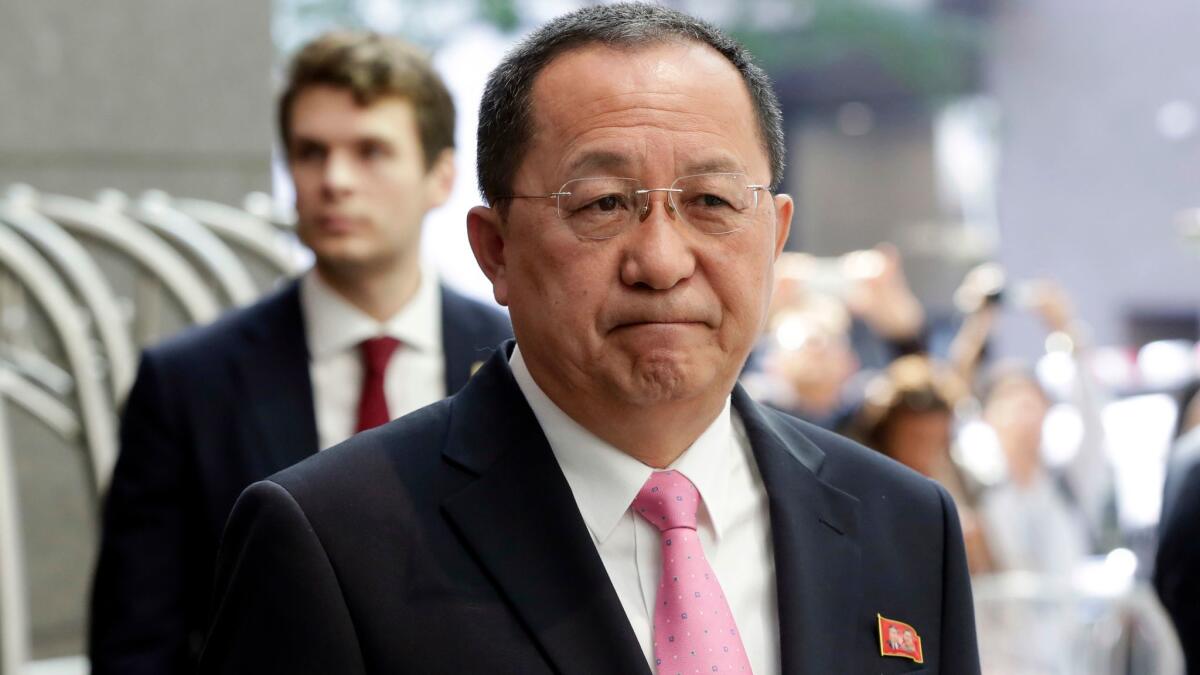North Korea says Trump declared war via tweet. The White House says it didn’t

To Ri, those include “the right to shoot down the United States strategic bombers even they’re not yet inside the airspace border of our country.”
- Share via
Reporting from NEW YORK — When is a tweet a declaration of war?
North Korea’s senior diplomat told reporters here Monday that President Trump’s most recent salvo on Twitter was tantamount to a formal declaration and that it would give North Korea the right to shoot down U.S. strategic bombers even outside North Korean airspace.
The White House quickly scoffed at the comments by North Korean Foreign Minister Ri Yong Ho.
“Not at all. We’ve not declared war on North Korea. And frankly, the suggestion of that is absurd,” said White House Press Secretary Sarah Huckabee Sanders at a news briefing.
The North Korean minister was reacting to Trump’s Saturday night tweet suggesting that North Korean leader Kim Jong Un, whom he mocked as “Little Rocket Man,” might soon be deposed or dead — he didn’t specify. The tweet followed a bellicose speech that Ri had delivered earlier that day calling Trump “mentally deranged” and hinting at the inevitability of war.
Under the North Korean political system, members of the ruling family are considered sacred, much like ancient Asian emperors. Notwithstanding the fact that the president was in a feisty mood over the weekend — he also verbally assailed the National Football League— the North Koreans chose to take Trump both literally and seriously.
“Trump claimed that our leadership wouldn’t be around much longer and hence at last he declared a war on our country,” Ri told reporters in New York.
“Since the United States declared war on our country, we will have every right to make countermeasures, including the right to shoot down United States strategic bombers even when they are not inside the airspace border of our country,” Ri told the reporters.

H.R. McMaster, the president’s national security advisor, said Monday that it would be “a suicide mission” if North Korea decided to attack the United States, but the American military must be prepared to take action.
“What we hope to do is avoid war but what we can’t do is discount that possibility,” he said at a Washington event hosted by the nonpartisan Institute for the Study of War.
No announcement was made on moving troops, ships or other weapons to the region.
North Korean propagandists like to throw around the term “declaration of war” — routinely applying it to economic sanctions. But beyond all the mudslinging of recent days, the name-calling and the rhetoric, the foreign minister’s words contained a specific threat. He was apparently referring to the show of force staged by the Pentagon over the weekend, when it flew B-1 bomber and F-15 fighter jets along North Korea’s eastern coastline, just within international airspace.
The Pentagon said that this was the closest American warplanes had flown to North Korea in this century.
In 1969, the North Koreans shot down an EC-121 reconnaissance plane 90 nautical miles off their coast over the Sea of Japan. All 31 Americans on board were killed in the single largest loss of life during the Cold War. The North Koreans claimed erroneously that the plane had strayed into its airspace. The Nixon administration did not retaliate.
If the same incident type of incident occurred today, it could very well trigger a larger Korean War that would engulf Asia.
Joel S. Wit, a senior fellow at the US-Korea Institute at the Johns Hopkins School of Advanced International Studies, said he wasn’t surprised by the foreign minister’s threat.
“What do people expect when you get into a shouting match with the North Koreans? This is perfectly predictable,” Wit said. Although the North Koreans are notorious for their hyperbolic threats, Wit said he believed they are serious about the possibility of shooting down U.S. planes.
“If you want to play a game of chicken, the North Koreans are not the right ones to play with,” Wit said.
Members of the Trump administration often try to soften the president’s words. Sanders on Monday issued the most conciliatory words out of the White House with regard to North Korea in some time.
“Our goal is still the same. We continue to seek the peaceful denuclearization of the Korean peninsula,” she said. “That’s our focus, doing that through both the most maximum economic and diplomatic pressures as possible at this point.”
Nevertheless, Col. Robert Manning, a Pentagon spokesman, told reporters Monday that the 28,500 American troops stationed on the Korean peninsula stand by their motto to be ready to “fight tonight” against North Korean aggression.
“Our job at the Department of Defense, as you know, is to make sure that the president is provided military options. We’ll continue to do that, and we have a deep arsenal of military options to provide the president so then he can decide how he wants to deal with North Korea and the regime,” Manning said.
U.S. military posture toward North Korea remained unchanged, Manning said, but “all options are on the table.”
The Pentagon aimed to send a message to Pyongyang on Saturday when it launched the B-1 bombers from Guam and F-15 fighter escorts from Okinawa, Japan, to fly as a “show of force” to North Korea.
Hours later, North Korean state media released a propaganda video mocking Trump and depicting fiery missile attacks on U.S. aircraft and warships. The 90-second clip, released by the DPRK Today news site, warned the U.S. military against considering action.
Times staff writer W.J. Hennigan in Washington contributed to this report.
Twitter: @BarbaraDemick
More to Read
Sign up for Essential California
The most important California stories and recommendations in your inbox every morning.
You may occasionally receive promotional content from the Los Angeles Times.










